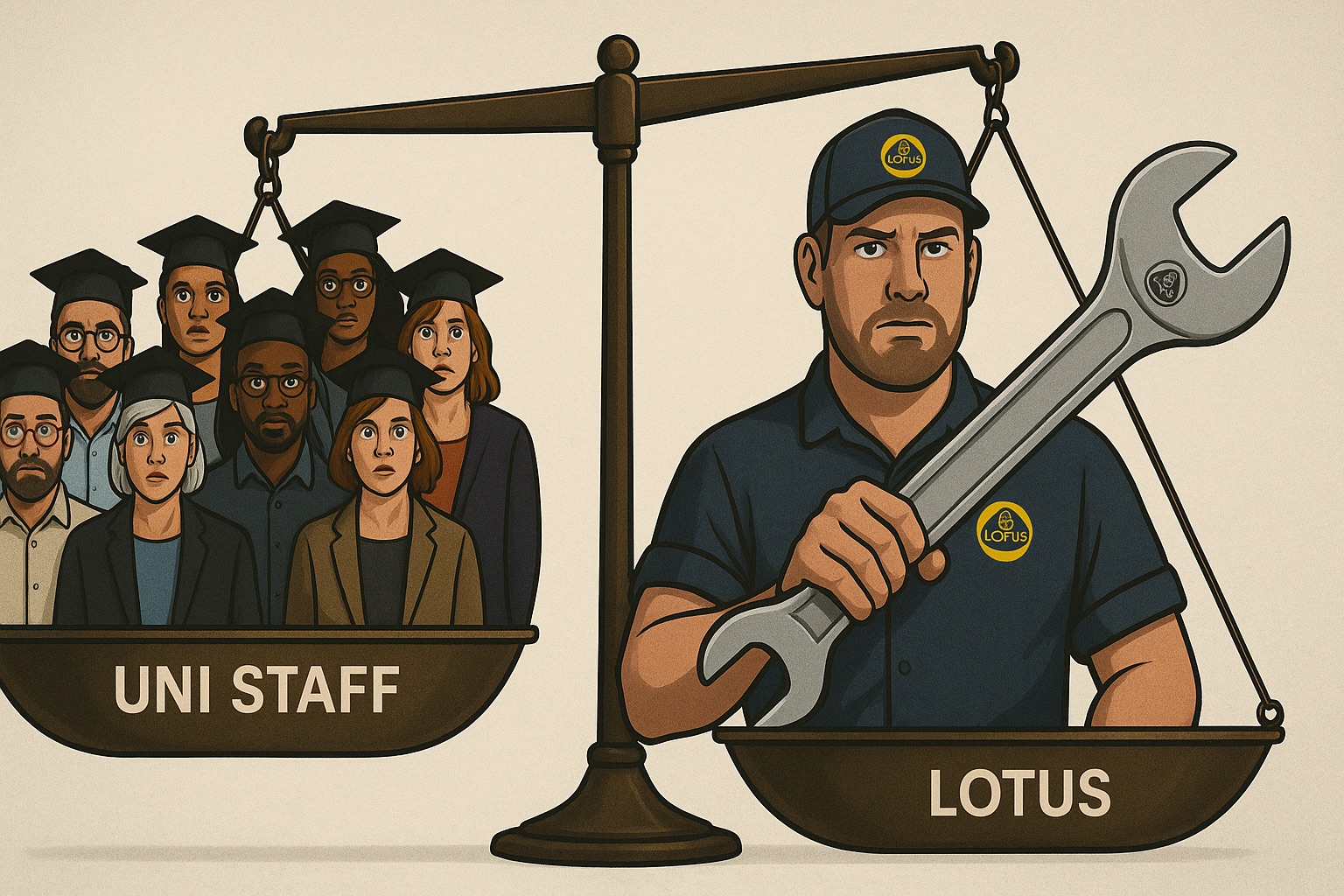Article
Governmental Shrugs: When Car Factories Matter More Than Universities


At British universities, 2025 is shaping up to be the year when 10,000 academic, technical and professional posts toddle off towards the Jobcentre, waving their P45s like tear-stained handkerchiefs. Westminster’s response has been a philosophical shrug tucked inside the well-rehearsed line that universities are “independent organisations” that really ought to jolly well clean up their own mess. By contrast, the merest newspaper flutter suggesting Lotus might moth-ball its Norfolk factory (all 1,300 jobs of it) prompted the Business Secretary to speed-dial the Chinese owners, after which the company dutifully announced that of course it wasn’t going anywhere, thank you very much. Apparently some independent organisations are more independent than others.
A Crisis in Ten Thousand Lessons
Teaching an undergraduate now costs about £12,500 a head, yet the fee cap in England has been frozen at £9,250 since 2017. Even Labour’s promised bump to a grandiose £9,535 next year adds little more than garnish. Unsurprisingly, the Office for Students reckons most institutions will be running deficits within two years.
Research is no lifeboat either: UK Research & Innovation normally pays 80% of full economic cost, leaving universities to find the other 20% down the back of the sofa. Across the sector, only 71% of research costs are actually recovered.
And then we removed the only profitable revenue stream. A ban on most dependants from January 2024 helped push international student visa applications down 12% in a single year, while dependant visas collapsed by 83%. When even The Pie News has the words “record fall” in its headline, you know it’s not a vintage year for campus optimism.
Government Guidance: Please Keep Calm and Self-Fund
Asked what might be done, ministers reliably point out that universities are free, sovereign entities, presumably able to mint their own bullion and grow money trees next to the sociology building. There are, of course, the odd exceptions north of Hadrian’s Wall: Dundee secured a £62 million Scottish Government loan (pronounced in Edinburgh as “fiscal prudence”, in St Andrews as “cheque-book socialism”). But for everyone else, the official line resembles a Victorian medical pamphlet: keep warm, drink beef tea, and try not to fade away.
Meanwhile in Norfolk: Deploy the Panic-Button
When a Financial Times whisper suggested Lotus might slide its production over to the United States, Whitehall’s hazard lights came on. Within hours the Business Secretary was arranging urgent talks, Lotus confirmed Hethel was safe for now, and Norfolk exhaled. The jobs at risk? A mere 1,300—roughly the headcount of a mid-sized faculty at, say, Sussex, but clearly of far greater strategic significance.
To be fair, car making is one of the few industrial pastimes Britain still practises competitively. Even in a wobbly 2024 the nation built almost 780,000 cars, exporting over three-quarters of them, and Whitehall is understandably twitchy about losing any remaining assembly lines. A fresh UK–US trade tweak trimming tariffs has only heightened the sense that the sector is a precious, if precarious, jewel.
Spot the Difference (Clue: It Isn’t the Extra Zero)
| Sector | Jobs under threat | Typical government reflex |
|---|---|---|
| Universities | 10,000 | “They’re independent; pass the biscuits.” |
| Lotus Cars | 1,300 | Phone call, statement, comfort blanket |
The delightfully lopsided enthusiasm suggests that, in the national pecking order, a hand-built sports car outranks a biomedical lab, a languages department and the entire postgraduate research pipeline combined. It may also explain why some vice-chancellors are eyeing the idea of bolting spoilers to the admin block and rebranding as “Higher Education, but with Cup Holders”.
Why It Matters (Beyond the Ivory Tower)
Universities underpin £95 billion of economic output, drive half of all basic research and train the very engineers Lotus will need for its next electric model. Starve them, and the future supply of skilled workers, patents and—let’s be honest—pub quiz champions goes with them. Yet policy continues to treat the sector as a cost centre rather than the soft-power and productivity machine every industrial strategy paper claims to cherish.
Closing Thoughts: A Polite Suggestion
If 10,000 university jobs do vanish this year, imagine the ministerial switchboard lit up with as many calls as Norfolk enjoyed last weekend. Until then, campus leaders might consider relocating to a disused airfield, painting everything British-Racing-Green and applying for a small but tasteful government rescue package. Stranger things have certainly received a ministerial phone-call.
“If you work in UK HE, tag one colleague and one MP who needs to see these numbers.”